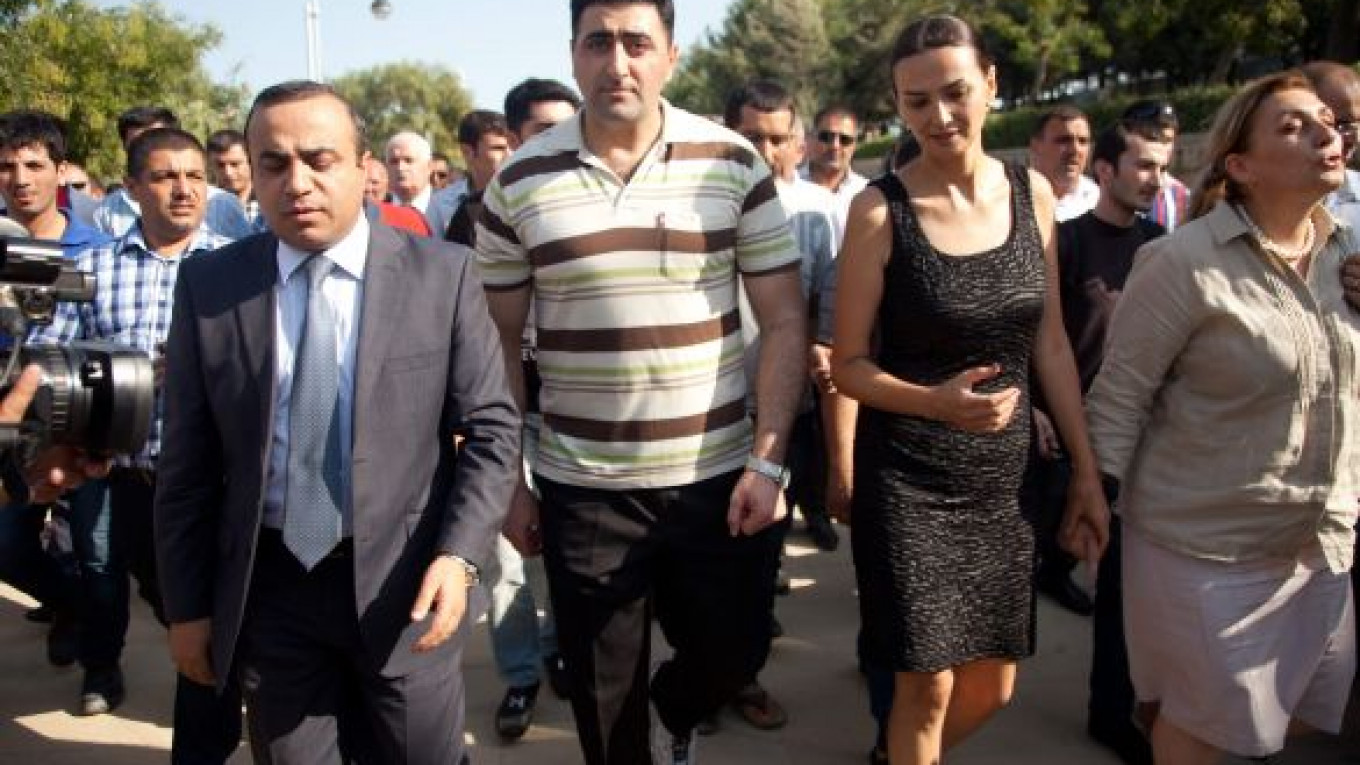BUDAPEST — Armenia broke off diplomatic ties with Hungary after an Azeri military officer sentenced to life in prison for killing an Armenian officer was sent back to his homeland and, despite assurances, immediately pardoned and freed.
Lieutenant Ramil Safarov was given a life sentence in 2006 by the Budapest City Court after he confessed to killing Lieutenant Gurgen Markarian of Armenia while both were in Hungary for a 2004 NATO language course.
In response to Safarov's release, Armenian President Serzh Sargsyan said his country was "halting diplomatic relations and all official ties with Hungary."
Protesters in the Armenian capital, Yerevan, threw tomatoes at the building housing Hungary's honorary consulate and tore down the Hungarian flag Friday, while on Saturday about 150 demonstrators set a Hungarian flag ablaze. ? ? ? ? ? ?
While Armenians were livid over Safarov's release, he is considered a hero by many in Azerbaijan for having killed an Armenian.
Hungary returned Safarov, 35, to Azerbaijan only after receiving assurances from the Azeri Justice Ministry that Safarov's sentence, which included the possibility of parole after 25 years, would be enforced.
"The Ministry of Justice of Azerbaijan has further informed the Ministry of Public Administration and Justice of Hungary that Ramil Sahib Safarov's sentence will not be modified but will immediately continue to be enforced, based on the Hungarian judgment," the Hungarian ministry said in a statement issued before the news of Safarov's release was known.
The ministry said it based its decision on the 1983 Strasbourg Convention on the Transfer of Sentenced Persons.
In a brief statement posted in English on his website, Azeri President Ilham Aliyev decreed Friday that Safarov "should be freed from the term of his punishment."
Hungary's Justice Ministry did not immediately respond to a request for comment on Safarov's release.
Hungary, which depends on Russia for most of its energy imports, has been seeking to expand its economic relations with oil-rich Azerbaijan.
Laszlo Borbely, the deputy director of Hungary's Government Debt Management Agency, last week told daily newspaper Magyar Nemzet that talks between the two countries about a possible purchase by Azerbaijan of up to 3 billion euros ($3.77 billion) in Hungarian bonds were only at an "exploratory phase" for now.
Moscow issued no public comment on the decision to free Safarov, but Washington said it was "communicating to Azerbaijani authorities our disappointment."
"This action is contrary to ongoing efforts to reduce regional tensions and promote reconciliation," National Security Council spokesman Tommy Vietor said in a statement, adding that Hungary was also being asked to explain its decision to send Safarov home.
Tensions are strong between Armenia and Azerbaijan over Nagorno-Karabakh, a region of Azerbaijan that has been under the control of Armenian troops and ethnic Armenian forces since 1994.
During his trial in Budapest, Safarov claimed that the conflict was at the root of his actions and that he used an ax to kill Markarian while the victim was sleeping in a dormitory room after the Armenian repeatedly provoked and ridiculed him.
"My conscience was clouded as a result of the insults and humiliating and provoking behavior, and I lost all control," Safarov told the court in April 2006.
Safarov's lawyers said that his parents and relatives were exiled from Nagorno-Karabakh during the war and that two of his relatives were killed by ethnic Armenian separatists.
Related articles:
A Message from The Moscow Times:
Dear readers,
We are facing unprecedented challenges. Russia's Prosecutor General's Office has designated The Moscow Times as an "undesirable" organization, criminalizing our work and putting our staff at risk of prosecution. This follows our earlier unjust labeling as a "foreign agent."
These actions are direct attempts to silence independent journalism in Russia. The authorities claim our work "discredits the decisions of the Russian leadership." We see things differently: we strive to provide accurate, unbiased reporting on Russia.
We, the journalists of The Moscow Times, refuse to be silenced. But to continue our work, we need your help.
Your support, no matter how small, makes a world of difference. If you can, please support us monthly starting from just $2. It's quick to set up, and every contribution makes a significant impact.
By supporting The Moscow Times, you're defending open, independent journalism in the face of repression. Thank you for standing with us.
Remind me later.


